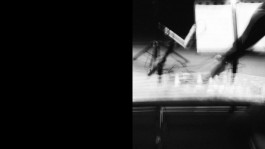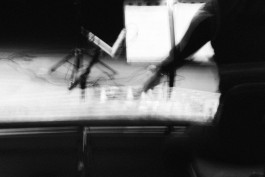Symposium on diversity,
categories and justice in
contemporary music
May 1, 2021, 12–06 PM, Online
⇩

Categories permeate our thinking – also in contemporary music. Genres are divided, this side and that side of the canon are asserted, boundaries between the free scene and the institution are demarcated. The current time of pause challenges us to new looks and debates: What if we really thought and listened diversely? What if we went back to sharing more instead of dividing?
In three panels, we will discuss corresponding spaces for action of a solidary, musical contemporaneity: from questions of post-migrant scenes to new music, to possible partnerships between institutions and the free scene, to political settings that protect and expand artistic free spaces.
An event in the framework of Tonlagen 30. Dresdner Tage der zeitgenössischen Musik #pause
In cooperation with Hellerau European Centre for the Arts, inm / field notes and VAN Magazine
Kübra Gümüşay’s most recent book deals with the problem of linguistic categories for our thinking, Max Czollek, a provocateur of the theatre landscape, has raised post-migrant discourse to a new level with his book “Disintegrate Yourself”. We will be talking to the composer Jessie Cox and the two artistic directors of the multi-diverse Berlin Trickster Orchestra, Ketan Bhatti and Cymin Samawatie: What artistic spaces of possibility does post-migrant multiperspectivity also offer for contemporary music?
Ketan Bhatti and Cymin Samawatie, Trickster Orchestra
Jessie Cox, composer
Max Czollek, author
Kübra Gümüşay, author and speaker
Moderation: Philipp Rhensius, Sociologist and music journalist as well as editor at Norient
Curation: Elisa Erkelenz
The current time of pause peels back an old question anew: How can we think about and realise fruitful synergies and alliances between the independent scene and institutional structures? What thresholds need to be overcome, whether of a legal, political or intellectual nature? Can the independent scene even lead concert halls and larger festivals back to political relevance and strengthen their role as anchors of a lively urban society? And how can we find a model of solidarity that protects artistic free spaces and polyphonies and moderates them on an equal footing?
Margareta Ferek-Petric, Biennial Zagreb, composer
Matthias Mohr, radialsystem
Sonja Lena Schmid, Decoder Ensemble
Steven Walter, Beethovenfest Bonn
Anahita Abbasi, Composer
Moderation: Leonie Reineke
Curation: Elisa Erkelenz
Also with regard to the funding of the independent scene compared to institutions, the current break reveals great inequalities. How can we maintain a vibrant independent scene and artistically productive ensemble landscape in new music? After looking at the institutions, we direct the discussion to cultural policy and funding policy settlements on toxic hierarchies on the one hand and approaches to sustainably protect a unique biotope on the other.
Gregor Hotz, Musikfonds e.V.
Annekatrin Klepsch, Second Mayor of the State Capital Dresden, Councillor for Culture and Tourism
Lena Krause, Freie Ensembles und Orchester e.V. (FREO)
Katja Lucker, Musicboard Berlin GmbH
Henning Mohr, Kulturpolitische Gesellschaft
Ruth Velten, LUX:NM
Moderation: Leonie Reineke
Curation: Elisa Erkelenz

Photo © Arnaud Ele
Symposium on diversity,
categories and justice in
contemporary music
May 1, 2021, 12–06 PM, Online

Categories permeate our thinking – also in contemporary music. Genres are divided, this side and that side of the canon are asserted, boundaries between the free scene and the institution are demarcated. The current time of pause challenges us to new looks and debates: What if we really thought and listened diversely? What if we went back to sharing more instead of dividing?
In three panels, we will discuss corresponding spaces for action of a solidary, musical contemporaneity: from questions of post-migrant scenes to new music, to possible partnerships between institutions and the free scene, to political settings that protect and expand artistic free spaces.
An event in the framework of Tonlagen 30. Dresdner Tage der zeitgenössischen Musik #pause
In cooperation with Hellerau European Centre for the Arts, inm / field notes and VAN Magazine
Kübra Gümüşay’s most recent book deals with the problem of linguistic categories for our thinking, Max Czollek, a provocateur of the theatre landscape, has raised post-migrant discourse to a new level with his book “Disintegrate Yourself”. We will be talking to the composer Jessie Cox and the two artistic directors of the multi-diverse Berlin Trickster Orchestra, Ketan Bhatti and Cymin Samawatie: What artistic spaces of possibility does post-migrant multiperspectivity also offer for contemporary music?
Ketan Bhatti and Cymin Samawatie, Trickster Orchestra
Jessie Cox, composer
Max Czollek, author
Kübra Gümüşay, author and speaker
Moderation: Philipp Rhensius, Sociologist and music journalist as well as editor at Norient
Curation: Elisa Erkelenz
The current time of pause peels back an old question anew: How can we think about and realise fruitful synergies and alliances between the independent scene and institutional structures? What thresholds need to be overcome, whether of a legal, political or intellectual nature? Can the independent scene even lead concert halls and larger festivals back to political relevance and strengthen their role as anchors of a lively urban society? And how can we find a model of solidarity that protects artistic free spaces and polyphonies and moderates them on an equal footing?
Margareta Ferek-Petric, Biennial Zagreb, composer
Matthias Mohr, radialsystem
Sonja Lena Schmid, Decoder Ensemble
Steven Walter, Beethovenfest Bonn
Anahita Abbasi, Composer
Moderation: Leonie Reineke
Curation: Elisa Erkelenz
Also with regard to the funding of the independent scene compared to institutions, the current break reveals great inequalities. How can we maintain a vibrant independent scene and artistically productive ensemble landscape in new music? After looking at the institutions, we direct the discussion to cultural policy and funding policy settlements on toxic hierarchies on the one hand and approaches to sustainably protect a unique biotope on the other.
Gregor Hotz, Musikfonds e.V.
Annekatrin Klepsch, Second Mayor of the State Capital Dresden, Councillor for Culture and Tourism
Lena Krause, Freie Ensembles und Orchester e.V. (FREO)
Katja Lucker, Musicboard Berlin GmbH
Henning Mohr, Kulturpolitische Gesellschaft
Ruth Velten, LUX:NM
Moderation: Leonie Reineke
Curation: Elisa Erkelenz

Photo © Arnaud Ele